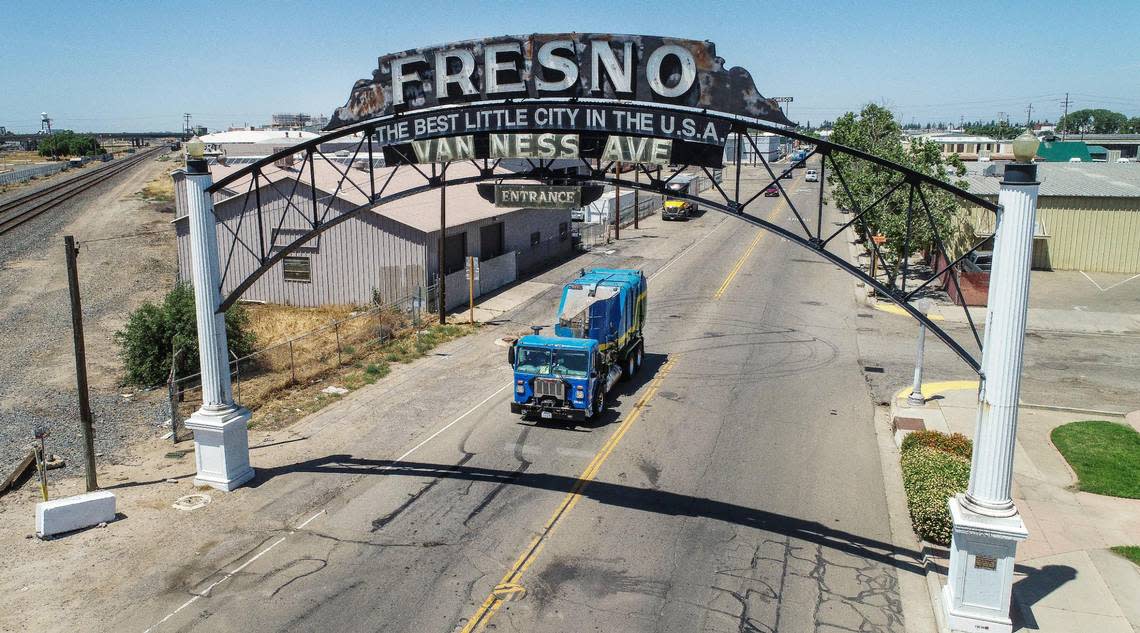Trash bills are heading higher for Fresno homeowners. Here’s what it will mean for you

Owners or renters of single-family houses in Fresno will start paying more for their city trash collection service next month after the City Council adopted a proposal that will raise bills by about 78% over the next five years.
Thursday’s 5-2 vote represents the first increase in solid-waste charges for the city of Fresno since 2009. Council members Garry Bredefeld and Luis Chavez voted against the increase.
The increase does not apply to apartment-dwellers or commercial, retail or industrial businesses whose trash is collected by franchised private companies rather than city Public Utilities Department employees.
Over the five-year period, the monthly bill for the standard residential trash service – once-weekly collection of 96-gallon carts for trash, for recycling and for green waste, such as leaves and lawn clippings – would increase by about 78.3% over the current rate:
Current: $25.37 per month.
Starting July 1, 2024: $30.87 per month, an increase of $5.50.
July 1, 2025: $35.50 per month, an increase of $4.63.
July 1, 2026: $38.70 per month, an increase of $3.20.
July 1, 2027: $41.99 per month, an increase of $3.29.
July 1, 2028: $45.24 per month, an increase of $3.25.
Rates are also going up by more than 114% for residents who have an “alternative” service with a smaller 64-gallon trash container along with the 96-gallon recycling and green-waste carts:
Current: $19.20 per month.
July 1, 2024: $28.12 per month, an increase of $8.92.
July 1, 2025: $32.34 per month, an increase of $4.22.
July 1, 2026: $35.25, an increase of $2.91.
July 1, 2027: $38.25, an increase of $3.00.
July 1, 2028: $41.21, an increase of $2.96.
Brock Buche, the city’s public utilities director, said last week that the increase is needed because the solid-waste division’s operating costs for labor, vehicles and fuel have increased substantially over the past 15 years, and the division’s expenses have outstripped the revenue from rates each year since 2018.
Tipping fees – the per-ton cost that the city pays to dispose of trash at a landfill or deliver green waste to a processing facility – are also up by about 13%, he said. Garbage workers collected about 164,000 tons of trash last year, along with 38,500 tons of recyclables and 82,000 tons of green waste.
Without the increase, Buche warned that the department would likely have to begin trimming its costs by reducing some of the services offered, including free document-shredding and free dumping days, scaling back the frequency for collecting recycling and green waste carts, or eliminating Operation Clean-Up, a once-a-year program across various neighborhoods of the city where residents can place large items at their curbside for collection, as well as other optional services.
Relief for low-income residents
Along with adopting the higher trash rates, the City Council approved the creation of a Solid Waste Affordability Credit Program, which will provide a $5 credit to the garbage bills for qualifying low-income residents.
The credit, which is modeled after a similar discount for city water services, “is intended to mitigate the first-year impact of the monthly solid waste rate and help make solid waste services more affordable for low-income customers in future years.”
The city estimates that about 8,300 households will be eligible for the discounts in the garbage and water services.
To qualify, households that apply for the credits must meet one of two criteria to document their low-income status:
Qualifying for PG&E’s CARE (California Alternate Rates for Energy) program, or for one of Fresno County’s human services programs including the Supplemental Nutrition Assistance Program or SNAP, the Women Infants & Children or WIC program, the National School Lunch Program or the Medi-Cal insurance program for low-income residents.
Have an annual household income that is equal to or less than 200% of the federal poverty guideline. Under the current 2024 federal calculations, the qualifying levels for the city credit would be $30,120 for a single-person household; $40,880 for two people; $51,640 for three people; $62,400 for a four-person household; and increasing thresholds for each additional person in a household.
As of Thursday, information on the credit for trash bills was not yet available on the city’s website, but details on the existing water bill credit are available online at https://bit.ly/3L7TyDW.
Not enough protests to block increases
The vote came a week after opponents of the increase failed to garner enough protest votes to block consideration of the proposed rates. Under a state law, Proposition 218, local governments are required to get residents’ approval for such rate increases. Fresno had sent out protest cards to more than 119,000 affected homeowners or renters with a 45-day period to return them.
A majority of those households, or a total of 58,480 protest cards, would have been required to stop the process, but fewer than 35,000 valid protests were received by last week, clearing the way for Thursday’s approval.


